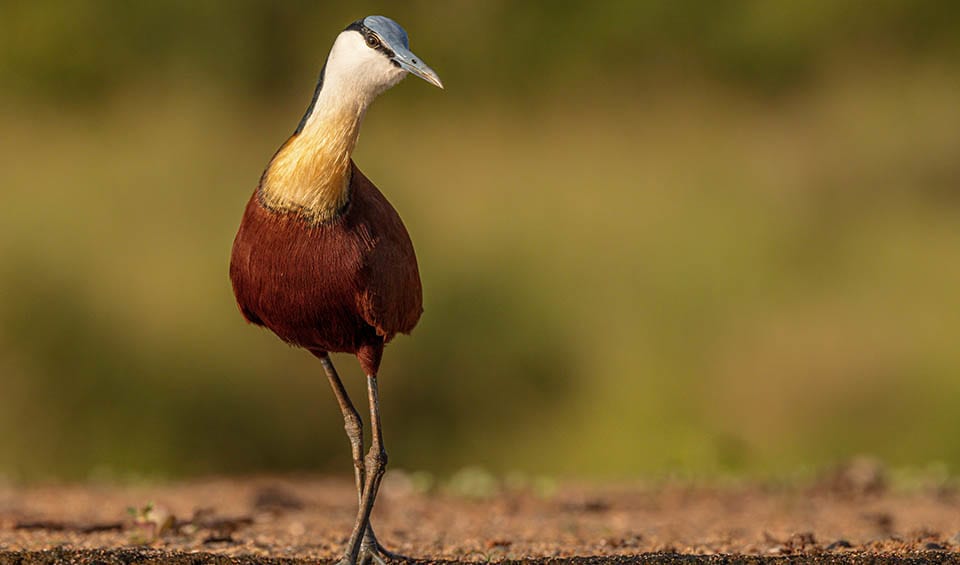One of the most eye-catching and unique water birds found across sub-Saharan Africa. Known for its incredible ability to walk on floating vegetation, it’s often called the “lily trotter” or even the “Jesus bird” for its seemingly magical talent to glide over water surfaces. This effect comes from its astonishingly long toes and claws that distribute its weight and allow it to walk across lily pads without sinking.
African jacanas have chestnut-brown bodies, white faces, and a light blue beak that extends into a forehead shield. This shield is actually made of skin and gets brighter during the breeding season, possibly playing a role in attracting mates. Despite their graceful appearance, they are not particularly good at flying or walking on land, but in the water-rich environments they call home—marshes, swamps, and wetlands—they move with elegance and purpose.
One of the most unusual aspects of the African jacana is its take on parenting and mating roles. In this species, the females are larger, more dominant, and polyandrous—meaning they mate with multiple males. The males, on the other hand, take on the full responsibility of parenting. After laying eggs in a nest that floats on the water, the female leaves, and the male incubates the eggs, protects the nest, and raises the chicks. He does so with intense dedication, even using his wings to tuck the chicks under his body when danger appears. In fact, it’s quite a sight to see—sometimes it looks like the father bird has an extra set of legs, but it’s actually the little ones peeking out from under his wings as he carries them away to safety.
Distribution
 Angola
Angola Benin
Benin Botswana
Botswana Burkina Faso
Burkina Faso Burundi
Burundi Cameroon
Cameroon Central Af. Rep.
Central Af. Rep. Chad
Chad Congo-Brazzaville
Congo-Brazzaville Côte D’ivoire
Côte D’ivoire DR Congo (Kinshasa)
DR Congo (Kinshasa) Equatorial Guinea
Equatorial Guinea Eswatini
Eswatini Ethiopia
Ethiopia Gabon
Gabon Gambia
Gambia Ghana
Ghana Guinea-Bissau
Guinea-Bissau Guinea
Guinea Kenya
Kenya Liberia
Liberia Malawi
Malawi Mali
Mali Mauritania
Mauritania Mozambique
Mozambique Namibia
Namibia Niger
Niger Nigeria
Nigeria Rwanda
Rwanda Senegal
Senegal Sierra Leone
Sierra Leone Somalia
Somalia South Africa
South Africa South Sudan
South Sudan Sudan
Sudan Tanzania
Tanzania Togo
Togo Uganda
Uganda Zambia
Zambia Zimbabwe
ZimbabweAnything we've missed?
Help us improve this page by suggesting edits. Glory never dies!
Suggest an editGet to know me
Terrestrial / Aquatic
Altricial / Precocial
Polygamous / Monogamous
Dimorphic (size) / Monomorphic
Active: Diurnal / Nocturnal
Social behavior: Solitary / Pack / Flock
Diet: Carnivore / Herbivore / Omnivore / Piscivorous / Insectivore
Migratory: Yes / No
Domesticated: Yes / No
Dangerous: Yes / No




